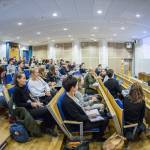 The world is full of crises – caused by wars, hunger, water scarcity and poverty – and humans need leaders who can deal effectively in complex situations and who obtain the required leadership skills for resolving the issues. Peace operations are, however, always based on collectivism and not on the actions of a few individuals. Passion and care for fellow humans is necessary. Leadership in peace operations was discussed on Tuesday, March 12th when the Master’s Degree Programme in Leadership for Change had the pleasure of hosting a guest lecture ‘Leadership in International Peace Operations: Managing the Changes and Challenges’ by Kirsi Henriksson, Director of Crisis Management Centre (CMC) Finland.
The world is full of crises – caused by wars, hunger, water scarcity and poverty – and humans need leaders who can deal effectively in complex situations and who obtain the required leadership skills for resolving the issues. Peace operations are, however, always based on collectivism and not on the actions of a few individuals. Passion and care for fellow humans is necessary. Leadership in peace operations was discussed on Tuesday, March 12th when the Master’s Degree Programme in Leadership for Change had the pleasure of hosting a guest lecture ‘Leadership in International Peace Operations: Managing the Changes and Challenges’ by Kirsi Henriksson, Director of Crisis Management Centre (CMC) Finland.
Leadership and Peace Operations
The career of Ms. Henriksson is a vivid one; she has acted as the Head of the European Union EUCAP Sahel Niger civilian crisis management mission (2016-2018) as well as worked in varied countries, e.g. Mali and Libya. Before her international posts, she worked as Research and Development Director of CMC Finland. This sums up to a broad experience of international crisis management and leadership in successful projects. In her current position, she is responsible for developing the CMC Centre, managing its operations and reaching the objectives. CMC Finland is a governmental agency, which sends experts to peace operation missions. It has currently 122 experts deployed all over the world.
In the beginning of her LFC Lecture, Ms. Henriksson highlighted that she will tell stories about leadership in peace operations, which are based on her own experiences, as crises are always unique and one leadership style cannot suit them all. Ms. Henriksson noted that the interpretations and ideas of what an international peace operation is are very different, because there is no guidebook which instructs how to be a leader in a multinational and multicultural cooperation project in a high-risk environment, where the business is not running as usual. Ms. Henriksson emphasised that it is easier to lead others, when one has experience of the same work. She doesn’t personally know many good leaders in peacekeeping operations and thinks that organizations should be tougher in saying no if they do not consider the person as a good leader.
 According to Ms. Henriksson, the problem is that there is not enough training to prepare people to be leaders in peace operations, and even if there were, it is not guaranteed that people with such education would be appointed to leadership positions. What is the reason behind it, she asked. Politics is the answer, Ms. Henriksson replied. In peace operations, one is still waving the flag of her home country – the leaders are picked up based on their nationality and quota of the troops. It is not always asked and questioned whether the person is a good leader.
According to Ms. Henriksson, the problem is that there is not enough training to prepare people to be leaders in peace operations, and even if there were, it is not guaranteed that people with such education would be appointed to leadership positions. What is the reason behind it, she asked. Politics is the answer, Ms. Henriksson replied. In peace operations, one is still waving the flag of her home country – the leaders are picked up based on their nationality and quota of the troops. It is not always asked and questioned whether the person is a good leader.
In addition, Ms. Henriksson explained why leadership positions are not that popular in peacekeeping operations. The work is not about sweets and flowers, but instead you are constantly struggling to understand the crises and be on top of human resource management. She highlighted that a good leader is the one who knows how to manage her people. It is the responsibility of the leader to assure equal treatment of all the peacekeepers, even if the initial situation, for example selection processes of the peacekeepers and payment, was significantly different.
Ms. Henriksson said that one of the saddest things in peace operations is primitive behaviour by the representatives of organisations. From ethical perspective, some of the peacekeepers may take steps backward: they somehow forget about the values promoted by their organisations. The peacekeepers may be there, for example, to enhance their careers, and do not obtain understanding of the country’s past, present and future, in other words, the local context. Thus, it is of utmost importance for everyone to understand what is the reason they are there. For leaders, this is unfortunate, because they must lead also when they have been disappointed, for example, by some people acting in a way that they would never do in their home countries. Such behaviour can endanger the whole mission and deteriorate its reputation. Once the reputation is gone, the mission is easily targeted. That’s why the credibility of the mission is very important. Hence, Ms. Henriksson highlighted that everyone must respect the values, follow the mandate and lead by example – all other actions increase the security risks of the operation.
Working with communities to deliver a mandate
 As mentioned, crisis management is about cooperation and dealing with different communities; civil societies, regional local authorities and various religious leaders. It is about respecting everyone, which is the beauty of the work. “50 shades of khaki”, Ms. Henriksson said. Engaging only with the target groups determined by the mandate of the operation is often not enough. A good leader needs to make sure that the diversity is respected, and all the relevant actors are involved.
As mentioned, crisis management is about cooperation and dealing with different communities; civil societies, regional local authorities and various religious leaders. It is about respecting everyone, which is the beauty of the work. “50 shades of khaki”, Ms. Henriksson said. Engaging only with the target groups determined by the mandate of the operation is often not enough. A good leader needs to make sure that the diversity is respected, and all the relevant actors are involved.
The problem, however, is that all the actors on site, such as NGOs, civilian missions, military, etc., want to do something, which can lead to overlaps and wasted monetary, human and knowledge resources. In other words, the peace operations are missing comprehensive and integrated conducts. This concept is known as the ‘peace industry’, where conflict cycles are missing, and people are sometimes doing harm instead of promoting local ownership.
Ms. Henriksson was frustrated with the fact that the problems faced in peace operations today are the same ones that have been acknowledged already 20 years ago. She highlighted the need to talk with all the stakeholders, resolving the issues and changing the procedures. Currently, the words are there but the action is missing. “The leader must be firm and noticeable”, stated Ms. Henriksson.
As an example, Ms. Henriksson mentioned the migration crisis a few years ago. The massive migration wave from Africa to Europe was a problem for the European Union, not so much to the African countries. Instead of trying to stop the migration flow, which would be not realistic, she focused her efforts in training the local authorities to tackle migration, especially human trafficking, and in raising awareness on how dangerous the journey can be. “You couldn’t say don’t go, but rather think twice before you go”, Ms. Henriksson said.
Ms. Henriksson stressed that as a leader, you cannot divide the local actors between good and bad ones. According to her, no one is good, as everyone is guilty of the past, and thus everyone is needed for reaching a better future and solving the situation. As a leader, you don’t have the luxury to choose who you work with. As a leader, you are a guest of a country, invited by the government and thus you need to work with the government and not to dictate what they must do, Ms. Henriksson noted.
Leadership & gender
 There’s not enough diversity in peace operations, but people of all ages, genders and skills are needed. Ms. Henriksson explained how especially women in lower positions face difficulties, but they may also take advantage of their situations, e.g. falling in love with the locals, which creates problems concerning unequal power relations. It is impossible to monitor people in their free time, and thus having mutual values in important. For Ms. Henriksson, it was not an issue to be a leader and a female, because she got the respect from male colleagues by leading coherently and by example. To be a leader, you must be a mixture of an angel and a devil, Ms. Henriksson described.
There’s not enough diversity in peace operations, but people of all ages, genders and skills are needed. Ms. Henriksson explained how especially women in lower positions face difficulties, but they may also take advantage of their situations, e.g. falling in love with the locals, which creates problems concerning unequal power relations. It is impossible to monitor people in their free time, and thus having mutual values in important. For Ms. Henriksson, it was not an issue to be a leader and a female, because she got the respect from male colleagues by leading coherently and by example. To be a leader, you must be a mixture of an angel and a devil, Ms. Henriksson described.
At the end of her lecture, Ms. Henriksson said that despite all the difficulties, she would go back to every place where she has been part of the crisis management team – not necessary as a leader, but to work for a good cause. According to her, being with wonderful people can lift you up, and also the places are often very beautiful. Interacting with local people is essential, as it helps to create a linkage with the environment and context. The main and only obstacle is security. Very often there are security restrictions that prevent people to move freely and interact with locals. Although Ms. Henriksson often took the risk and did not strictly respect the security recommendations, she acknowledged that it was important to ensure the security of the members of the mission. She stressed that finding a balance between those two is not always easy.
She also acknowledged the need for challenges in peace operations, because they build good leaders. It is about continuous change management.
 Once the presentation of Ms. Henriksson was approaching the end, we had the pleasure to hear the comments of Professor Marko Lehti from Tampere Peace Research Institute (TAPRI). He pointed out that most of the peacekeeping operations have a political and often hidden role, even though Finland seems not to be posing national issues in peace operations. Prof. Lehti posed a question to Ms. Henriksson, asking whether these hidden interests should be more visible. In response, she said that there is no use in hiding political motives, because everyone acknowledges their presence. However, the reputation of an operation should not be affected. After all, these operations are politically established.
Once the presentation of Ms. Henriksson was approaching the end, we had the pleasure to hear the comments of Professor Marko Lehti from Tampere Peace Research Institute (TAPRI). He pointed out that most of the peacekeeping operations have a political and often hidden role, even though Finland seems not to be posing national issues in peace operations. Prof. Lehti posed a question to Ms. Henriksson, asking whether these hidden interests should be more visible. In response, she said that there is no use in hiding political motives, because everyone acknowledges their presence. However, the reputation of an operation should not be affected. After all, these operations are politically established.
Professor Lehti was also interested to know Ms. Henriksson’s opinion on where should the ideal meeting place between practitioners and researchers be regarding the civil crisis management. Ms. Henriksson replied that research is very important, because practitioners often do not have time to analyse, as they do things in a hurry. An external eye is needed to observe and answer the question on “whether we are doing the right thing”.
In addition, Professor Lehti was interested if there has been a change towards more adoptable crises management. Ms. Henriksson explained that such change has not been noticeable yet, because it can be challenging to find leaders who want to strive towards changing the leadership patterns. She said that it’s also important to note that “the leader should have a life also after the leadership position.”
Find the previous LFC Lectures on Radio Moreeni’s SoundCloud account!

The lecture was organised by first-year LFC students Marina Danoyan, Tiia Eerola, Sini Anttila, Khalil Mozaffari, Leena Ylinen and Jani Pyrrö.
Photos by Jonne Renvall/Tampere University.


Comments